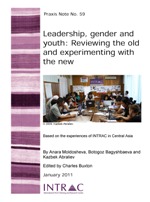Gender had long been a priority in INTRAC’s programme to strengthen  NGOs supporting self-help movements in Kazakhstan, Kyrgyzstan and Tajikistan. The self-help activities successfully included women, particularly those in rural areas. However, we were becoming concerned that these activities were not impacting upon pervading gender power relations. Traditional gender roles were not changing or being challenged.
NGOs supporting self-help movements in Kazakhstan, Kyrgyzstan and Tajikistan. The self-help activities successfully included women, particularly those in rural areas. However, we were becoming concerned that these activities were not impacting upon pervading gender power relations. Traditional gender roles were not changing or being challenged.
We were also concerned about the role of young people in communities, particularly after the violence in Kyrgyzstan in April 2010. Young people had been visibly involved in the violence but they had also been active in efforts to restore stability. They had an important role to play in their communities and we wanted to support this through the self-help movements. We developed a leadership aspect in the programme to support self-help movements. We wanted to bring together new ’agents for change’ within self-help groups and NGOs and effectively address gender and age discrimination.
In this paper, we show how we raised gender and youth issues of through promoting the leadership of women and young people in the self-help movement in Central Asia. It describes how new technologies and social media were employed to support action by women and young people in rural communities and what we learnt along the way.
Download:
Praxis Note 59. Leadership, gender and youth: Reviewing the old and experimenting with the new
.pdf (0.70mb)
Download:
Praxis Note 59. Leadership, gender and youth: Reviewing the old and experimenting with the new - Russian
.pdf (0.59mb)